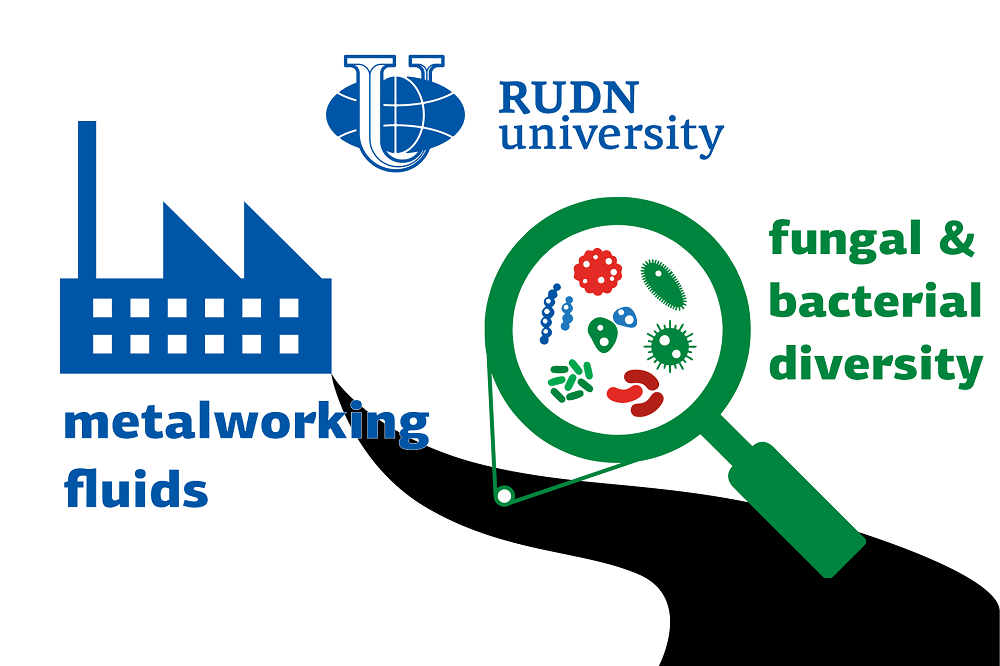RUDN Biologists Study Live Microorganisms in Toxic Liquids for Metalworking

Metal parts during processing must be lubricated, cooled and protected with special liquids. Large factories annually use thousands of tons of such cutting fluids (coolants), which must be disposed of after use. Liquids are toxic, which makes it impossible to dispose of them with household waste. Once in the water, they make it dangerous to the environment. Microorganisms can cope with this problem. They can “digest” toxic residues and make water safer. This process is called biodegradation. To find such microorganisms, you need to find out which of them are able to survive in a toxic environment. To do this, RUDN biologists determined the composition of the microbiota in the coolant.
“Metalworking fluids are used to lubricate, cool and remove metal chips in turning, milling, boring, grinding, drilling and other operations. The disposal of such liquids is a serious problem. To reduce environmental damage, new methods are needed. Artificial introduction of cultures of microorganisms can accelerate the decomposition of used fluids. Therefore, we decided to study the fungal and bacterial microbiota of the waste fluids,” Sergey Elansky, Doctor of Biology, Professor at RUDN University’s Agrobiotechnological Department.
Biologists studied 9 types of liquids obtained from various metalworking enterprises using two methods. The first one is the traditional method of isolating pure cultures. The second is next generation sequencing (NGS). Using NGS, bacteria of 18 genera and fungi of 17 genera were identified that can grow in the coolant. Pure cultures of microorganisms were tested for growth in 6 different cutting fluids. The most active microorganisms for the biodegradation of waste liquids were selected — they turned out to be fungi of the genus Fusarium.
“Data on the species composition of microorganisms in waste metalworking fluids will allow us to develop specific and highly sensitive test systems that can be used to search for and evaluate the concentration of the most active degrading microorganisms. This will optimize and reduce the cost of waste coolant disposal,” Elena Chudinova, PhD, Head of the Laboratory for Molecular Analysis of Microorganisms at RUDN University.
The results are published in the Journal of Cleaner Production.
RUDN summarized the results of the scientific competition "Project Start: work of the science club ". Students of the Faculty of Physics, Mathematics and Natural Sciences have created a project for a managed queuing system using a neural network to redistribute resources between 5G segments. How to increase flexibility, make the network fast and inexpensive and reach more users — tell Gebrial Ibram Esam Zekri ("Fundamental Computer Science and Information Technology", Master's degree, II course) and Ksenia Leontieva ("Applied Mathematics and Computer Science", Master's degree, I course).
The National Demographic Report, 2023 Demographic Well-Being of Russian Regions (hereinafter - the National Demographic Report) was prepared by the scientific team of the Institute of Demographic Studies of the Federal Research Center of the Russian Academy of Sciences, the Vologda Scientific Center of the Russian Academy of Sciences, Peoples' Friendship University of Russia, the Center for Family and Demography of the Academy of Sciences of the Republic of Tatarstan, as well as with the participation of leading scientists from the Republic of Bashkortostan, Stavropol Krai, Volgograd, Ivanovo, Kaliningrad, Nizhny Novgorod, Sverdlovsk Oblasts and Khanty-Mansi Autonomous Okrug–Yugra.
RUDN summarized the results of the scientific competition "Project Start: work of the science club ". Students of the Faculty of Physics, Mathematics and Natural Sciences have created a project for a managed queuing system using a neural network to redistribute resources between 5G segments. How to increase flexibility, make the network fast and inexpensive and reach more users — tell Gebrial Ibram Esam Zekri ("Fundamental Computer Science and Information Technology", Master's degree, II course) and Ksenia Leontieva ("Applied Mathematics and Computer Science", Master's degree, I course).
What is your first association with the word “laboratory”? Flasks and beakers? Microscopes and centrifuges? Yes, many of us would answer the same way.
The National Demographic Report, 2023 Demographic Well-Being of Russian Regions (hereinafter - the National Demographic Report) was prepared by the scientific team of the Institute of Demographic Studies of the Federal Research Center of the Russian Academy of Sciences, the Vologda Scientific Center of the Russian Academy of Sciences, Peoples' Friendship University of Russia, the Center for Family and Demography of the Academy of Sciences of the Republic of Tatarstan, as well as with the participation of leading scientists from the Republic of Bashkortostan, Stavropol Krai, Volgograd, Ivanovo, Kaliningrad, Nizhny Novgorod, Sverdlovsk Oblasts and Khanty-Mansi Autonomous Okrug–Yugra.